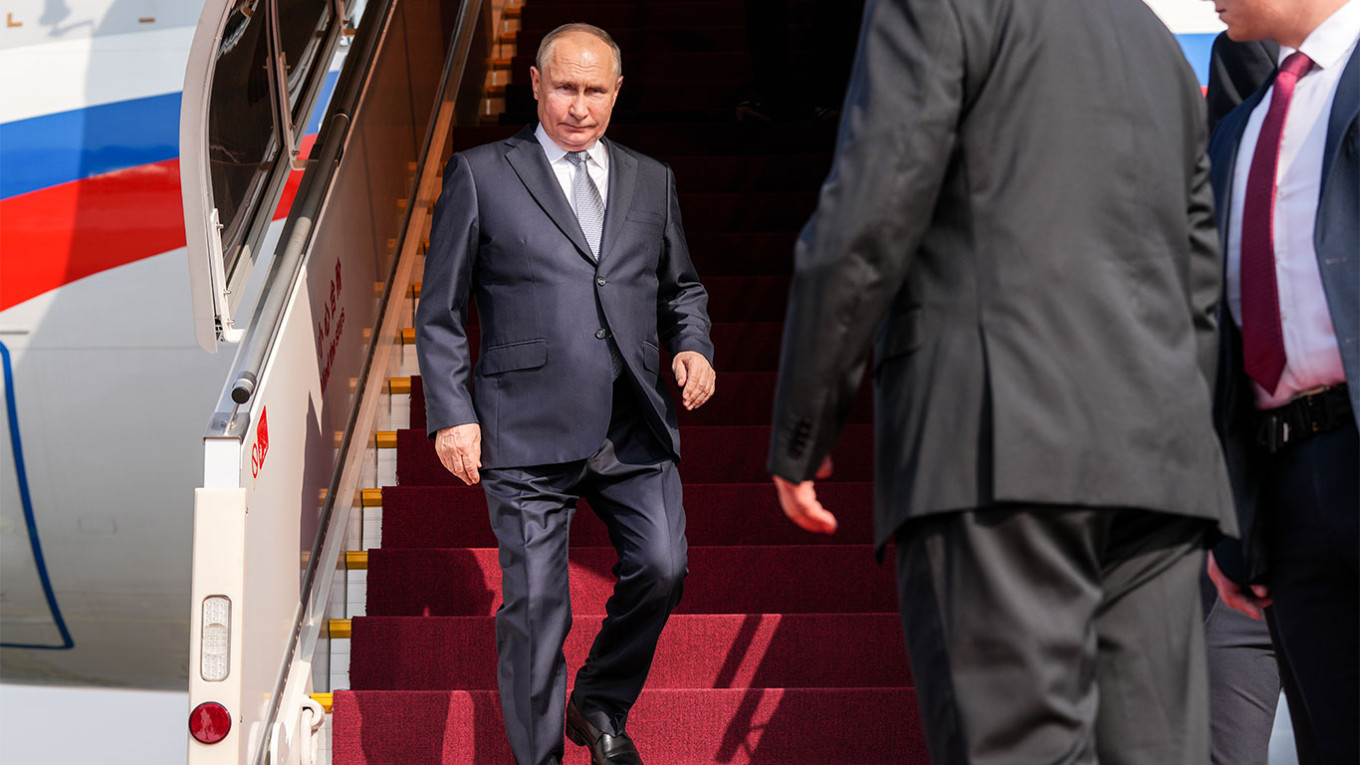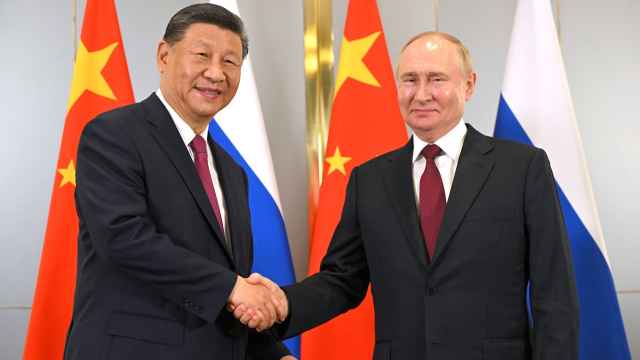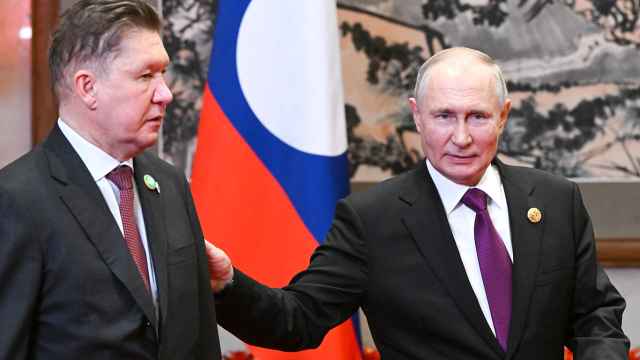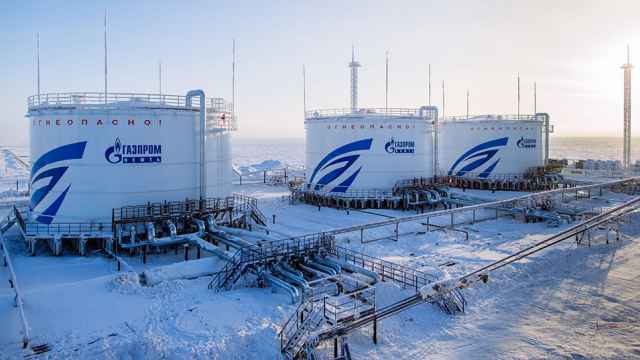President Vladimir Putin arrived in Beijing for talks with Chinese counterpart Xi Jinping on Tuesday, seeking diplomatic and economic support from a key ally as his war in Ukraine drags on and Russia's dependence on China grows.
The Kremlin hopes to secure major commodity contracts, agreements to share cutting-edge technologies and an official declaration of Beijing’s backing of Moscow, independent experts on Russia-China relations and energy as well as a former senior Russian diplomat told The Moscow Times.
Putin might not obtain all of that, but expects that his “dear friend” will at least provide assurances of friendship and an understanding of Moscow's interests as legitimate.
“China’s support for Moscow in particular will be used in [Russia’s] negotiations with the Global South,” Boris Bondarev, a Russian diplomat who resigned in protest of the invasion of Ukraine in 2022, told The Moscow Times.
Putin and Xi, whose strategic partnership has deepened as both seek to counter the West, hailed Moscow and Beijing’s “no-limits” partnership in February 2022, just weeks ahead of Russia’s full-scale invasion of Ukraine.
The visit marks Putin’s first trip outside the former Soviet Union since the International Criminal Court issued a warrant for his arrest in March. Like Russia, China is not a member of the ICC and is not obliged to arrest him.
During his two-day visit, Putin will attend a forum marking 10 years of the Belt and Road Initiative, China's influence-boosting global infrastructure program. He is scheduled to hold bilateral talks with Xi on Wednesday.
The Russian president has brought a large delegation of officials to Beijing that includes key ministers from the government's finance and energy blocs.
Among them are the deputy prime ministers for energy and technology, the finance minister, the head of the Central Bank, the powerful heads of the Gazprom and Rosneft energy giants, and the head of Russia’s largest lender, Sberbank.
Also in the delegation are the heads of the Federal Service for Military-Technical Cooperation and Rosfinmonitoring, the financial intelligence agency.
"Ideally, Putin would want big raw materials contracts, but they won't happen now. Because any optics that contracts with China provide new sources of income to Putin's military treasury is bad for China. And China is in a position not to do it even if the Russians really want it," said Alexander Gabuev, a leading Russian expert on relations with China, to The Moscow Times.
The Power of Siberia 2 gas pipeline, which traverses Mongolia, is one such project in which the Kremlin is trying to raise China’s interest.
However, Beijing has repeatedly told Moscow it doesn't need the pipeline, Mikhail Krutikhin, of independent consulting agency RusEnergy, told The Moscow Times.
The Kremlin sees the project as a way to replace revenues lost due to the end of Russian gas supplies to Europe.
"For political reasons, China can agree to something with a very good price," Krutikhin said.
"But even in this case, such a pipeline, with a capacity of 55 billion cubic meters a year, will still not replace the halted supplies to Europe: 155 billion cubic meters a year,” Krutikhin said. “And its construction and launch may take at least 10 years.”
Beijing is nonetheless keen on cooperation with Russia. In the nearly two years since the invasion of Ukraine, the volume of trade turnover between the countries has already increased by 60%, Gabuev said.
By early 2024, trade turnover between the countries could reach $200 billion a year, Putin said in an interview on the eve of his visit to China.
Despite its close ties with Russia, China has sought to walk a diplomatic tightrope over the war in Ukraine, attempting to put itself forward as a mediator earlier this year with a peace plan that was praised by Putin but treated with skepticism by Ukraine and its Western allies.
China may have supplied Russia with dual-use goods, including parts for drones, Western media reported in March 2023.
Beijing has denied supplying arms to either side of the conflict. Moreover, in the spring of 2023, China refused to supply weapons to the Wagner mercenary group, according to the Financial Times.
The country has nonetheless played a key role in propping up the heavily sanctioned Russian economy since the start of the war.
It has stabilized Russia's consumer market by substituting goods from the U.S. and Europe that would otherwise disappear from the market or increase in price due to markups by middlemen, Mikhail Korostikov, a China expert and columnist at the Carnegie Russia Eurasia Center, told The Moscow Times.
"The Kremlin believes that with the exception of specific categories of goods, Russia is coping with the war and military production on its own,” Korostikov said. “But in terms of consumer goods, without China, Russia would see such a deterioration in its socioeconomic situation that it would become extremely difficult to continue the war.”
In addition to political and economic issues, Moscow also relies on Beijing’s expertise in internet censorship as it tightens control over information inside the country.
Experts from China traveled to Moscow in March to advise the Kremlin and Russian internet service providers on blocking YouTube and VPN services, Russian media outlets wrote following Xi's visit to Russia that month.
Russian internet watchdog Roskomnadzor has been purchasing equipment abroad, in particular from the Chinese company Huawei, including microprocessors and motherboards to prepare for the blocking of VPN services, YouTube, WhatsApp, Telegram and other foreign platforms, according to the independent investigative outlet The Insider.
"Russia has long been considered a big brother to China. Now it is in an unprecedentedly weaker position vis-à-vis China than ever before," Gabuev said.
Moscow is far from being powerless in this dynamic, however.
"But that doesn't mean Beijing can dictate anything to Moscow. It is only increasing its influence. Russia is a powerful major power with nuclear weapons. And the antagonism between China and the United States makes China look at Russia as an important rear that it has to somehow maintain," Gabuev said.
A Message from The Moscow Times:
Dear readers,
We are facing unprecedented challenges. Russia's Prosecutor General's Office has designated The Moscow Times as an "undesirable" organization, criminalizing our work and putting our staff at risk of prosecution. This follows our earlier unjust labeling as a "foreign agent."
These actions are direct attempts to silence independent journalism in Russia. The authorities claim our work "discredits the decisions of the Russian leadership." We see things differently: we strive to provide accurate, unbiased reporting on Russia.
We, the journalists of The Moscow Times, refuse to be silenced. But to continue our work, we need your help.
Your support, no matter how small, makes a world of difference. If you can, please support us monthly starting from just $2. It's quick to set up, and every contribution makes a significant impact.
By supporting The Moscow Times, you're defending open, independent journalism in the face of repression. Thank you for standing with us.
Remind me later.







